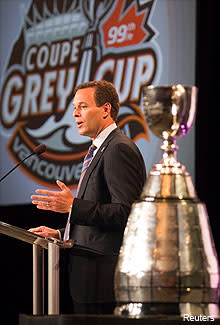Cohon: ‘The challenge for our league is in Southern Ontario’
Amid all the glowing reviews and positive feedback in CFL Commissioner Mark Cohon's annual state of the league address was one dark cloud.
And that cloud is positioned squarely over Southern Ontario.
Cohon acknowledged there is work to be done with the Hamilton Tiger-Cats and Toronto Argonauts in order for them to strive the way the league's six other teams are.
"We still face a challenge and that challenge for our

league clearly is in Southern Ontario," Cohon said. "I'm confident that the Tiger-Cats, under the leadership of Bob Young, with their new stadium in 2014, and with their strong plan to regionalize their fan base and grow outside of Hamilton into Burlington, Ancaster, St. Catherines and London and Guelph — I'm confident their future is bright.
"On the other hand, I think the Argos are just beginning their journey under David Braley. He is a proven leader, he is a proven owner with a great track record."
Braley bought the struggling Argonauts in 2010 and also owns the B.C. Lions. Now in charge of 25 percent of the league's teams, Braley is charged with "bringing the pride back" to Toronto.
"It starts with ownership," Cohon said. "And Braley is now prepared to make the changes to really start turning around that franchise. He's done it [in Vancouver], he knows what it takes in terms of the right personnel, the right marketing campaigns. It's our job within the CFL to give him that support."
In an effort to start that push, Cohon announced the league was committing $1-million, to be shared equally between the Ticats and Argos, to marketing campaigns and grassroots initiatives in Southern Ontario.
"We're working with both franchises; the commitment is from the entire board of governors. It's coming out of the league budget. The franchises have presented business plans to us and we're supporting those business plans."
But rest assured, there is no quick fix. The two Ontario teams are constantly fighting for eyeballs, coverage and television time with a number of other pro sports franchises. The thinking in Hamilton goes that a new stadium being built at the current Ivor Wynne Stadium, along with an improving on-field product, will help invigorate the team.
The solution isn't so clear in Toronto. Cohon pointed out that Toronto is a hockey town first, and a diverse city in which they must try to attract new Canadians. On the field, after a breakthrough year in 2010, the Argos dropped back to 6-12 in 2011 and missed the playoffs. They play their home games at the cavernous Rogers Centre and average little more than 20,000 fans a game. But don't count on Toronto joining the CFL's stadium-building boon any time soon.
"David Braley is clearly committed to the Rogers Centre," Cohon said. "He wants to make it work, he's had the experience here in B.C. of turning around a franchise where there were 8,000 people going to games and now there are over 30,000. He wants to figure out a way to make the Rogers Centre work and he's started conversations with the most senior management at Rogers to do that."
Cohon and the Argonauts organization is encouraged, however, by the demographics at home games.
"One thing that is interesting about the Argos — when you walk through their stadium, there are a lot of young people there. That bodes well for our future, and we need to figure out how to continue to connect with those young people."
Next year's Grey Cup, the 100th edition, will be held in Toronto and will hopefully raise the league's profile in Canada's biggest city and business capital. But that's just the beginning. The team and the league are working on a long-term plan.
"There's no magic wand we can wave," Cohon said. "It's going to be hard work. It's going to be having better presence in the market to help the Argos and help the CFL but I think we're going to do it."
***

 Yahoo Sports
Yahoo Sports 
